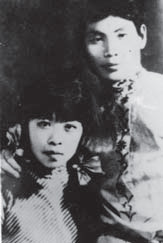Following in the footsteps of tragedy
|
|
|
Xiao Hong and Xiao Jun rise as literary stars in Shanghai in the 1930s thanks to Lu Xun's help.[Photo/China Daily] |
Born Zhang Naiying to a landlord's family in Hulan county, half an hour's drive from Harbin, capital of Heilongjiang province, Xiao was close to her grandfather, who inspired her to read and write.
The death of her mother and grandfather, plus her father's coldness, compelled her to leave home in 1930 and study in Beijing.
She was unable to support herself, however, and returned to live with her family-arranged fianc. They stayed at an inn in Harbin, but couldn't pay the rent.
Wang disappeared when she was about to go into labor.
Among sympathetic visitors was Xiao Jun (1907-1988), an up-and-coming writer.
Ye Jun, a researcher on Xiao Hong with Heilongjiang University, says the oft-repeated story about Xiao Jun saving Xiao Hong on a boat as a flood inundated Harbin in 1932 is not quite true.
"If it was not for the flood, Xiao Hong would have been sold to a brothel by the innkeeper, who fled as the water submerged the first floor (of the inn). It was a Red Cross boat that saved Xiao and other refugees," Ye says.
Xiao Jun did take her in after the flood. Unable to support themselves, they had to give away the baby girl for adoption.
In 1934, they moved to Shanghai, where Lu Xun enthusiastically promoted their works. After Japan occupied Northeast China in 1931 and prepared to swallow the rest of the country, people were eager to learn about the experiences of those suffering in the occupied lands. Xiao Jun's novel Village in August, and Xiao Hong's Field of Life and Death won immediate popularity.
Xiao Hong was in Japan when Lu Xun passed away in 1936. Her relationship with Xiao Jun was hopeless; she didn't even bother telling him about her pregnancy when they said goodbye to each other in 1938.
Duanmu Hongliang (1912-1996), another young writer from Liaoning province of Northeast China, married Xiao Hong the same year.
But three days after she gave birth to a son, Xiao calmly told a friend the baby had passed away in the night.
Due to the chaos of war, it was already difficult to feed herself, and Xiao probably didn't want to give Duanmu an extra burden, Ye Jun says.
In 1940, the couple moved to Hong Kong as Japanese troops were marching south on the mainland. She wrote a drama about Lu Xun to celebrate his 60th anniversary.
In December of that year, she finished Tales of Hulan River, described by Mao Dun as "a narrative poem, a colorful landscape painting and a series of sad lullabies".
As the Japanese reached Hong Kong, Xiao was transferred to several hospitals, suffering from complications of tuberculosis.
Before she passed away on Jan 22, 1942, she wrote: "I shall stay forever with the blue sky and green water, leaving the last part of Dream of Red Mansions for others to write ... Being despised and met with a cold shoulder for half my life ... to die prematurely, unwilling, unwilling."



















